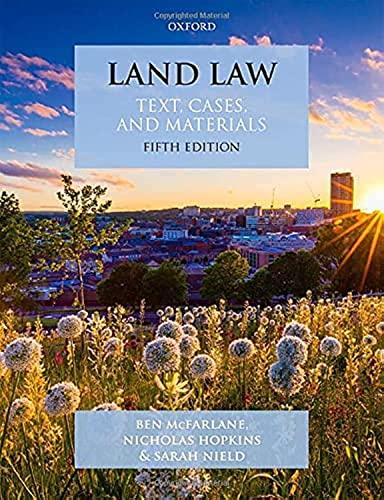Question
In 1998-99 John Leonard watched a Pepsi commercial and thought he had an opportunity to purchase a Harrier Jet (military aircraft) worth approximately $23M for
In 1998-99 John Leonard watched a Pepsi commercial and thought he had an opportunity to purchase a Harrier Jet (military aircraft) worth approximately $23M for the cash equivalent of $700K.He collected enough money, added the jet to the bottom of the order form in the Pepsi catalog and sent it in to Pepsi.When they refused to produce the jet and returned his money, he filed a lawsuit for breach of contract. After watching the YouTube video presentation ofPepsi's Harrier Jet Commercial,
https://www.youtube.com/watch?v=r2esUijwSGE
Question 1
In his lawsuit against Pepsi, Mr Leonard argued that a contract for the sale of a Harrier Jet had been created between him and Pepsi.This biggest problem in his case was proving that the two parties had arrived at anagreement(one of the required elements for contract formation - agreement, consideration, capacity and lawful object).Using the termsofferee, offeror, offer and acceptancedescribe how Mr. Leonard and his attorney argued that a contract had been created.
Question 2
Pepsi on the other hand argued against the creation of a contract by saying there was noagreementbetween the parties.Using those same terms;offeree, offeror, offer and acceptance, explain Pepsi's argument. Does Pepsi think they are theofferoror are they theofferee?From Pepsi's perspective, was there ever anofferthat was accepted?
Question 3
Advertisements are discussed as a "special offer" type in your textbook.Explain this "advertisements rule.How does this advertisements rule apply toLeonard v. Pepsico?Does it (the advertisements rule) suggest that a contractual "offer" was made in this case?
Question 4
The Objective Theory of Contracts was also an important legal principle used by the judge in his decision on this case (Leonard v. PepsiCo). explain the Objective Theory of Contracts (it is discussed in your textbook).Apply it to the facts of this case.Is it "reasonable" to assume Pepsi's commercial is a contractual "offer" for the sale of a Harrier Jet?Why or why not?
Question 5
Based on your analysis of both the Advertisements Rule and the Objective Theory of Contracts, whose argument is stronger - Pepsi's or Mr. Leonard's? If you were the judge deciding this case how would you decide it?
Question 6
Many companies feel they must include "disclaimers" at the end of all of their commercials because of cases like this and that "reasonable people" are no longer important our legal system.Do you agree or disagree?Should Pepsi have to put a disclaimer at the end of their advertisements that top secret military aircraft cannot be sold to high school students?Should Red Bull have to explain at the end of their commercials that their energy drink does not "give you wings" in a literal sense?
Step by Step Solution
There are 3 Steps involved in it
Step: 1

Get Instant Access to Expert-Tailored Solutions
See step-by-step solutions with expert insights and AI powered tools for academic success
Step: 2

Step: 3

Ace Your Homework with AI
Get the answers you need in no time with our AI-driven, step-by-step assistance
Get Started


